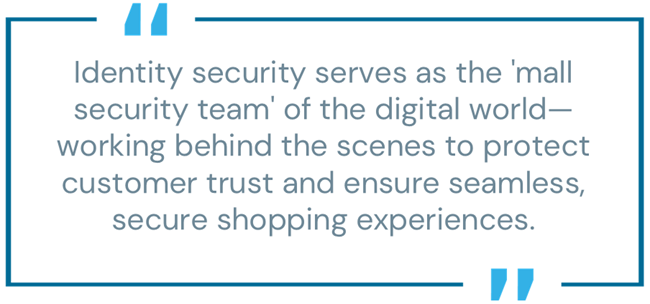
As retailers prepare for a season of high-demand online shopping, the risks of cyberthreats continue to grow, much like the need for increased security in a bustling mall on busy shopping days. In today’s retail landscape, identity security serves as the “mall security team” of the digital world—working behind the scenes to protect customer trust and to help ensure seamless, secure shopping experiences. No longer just a back-office concern, identity security has become the bedrock of consumer confidence, especially in e-commerce, where data protection and trust are paramount to operational resilience.
Strengthening Retail Platforms with Strong Identity Guards
In an era of digital transformation, identity security has become essential for navigating the complex threat landscape in retail and e-commerce. With online shopping at an all-time high and cybercriminals increasingly targeting e-commerce data, retailers need a dedicated digital “security team” to protect operations and safeguard customer trust. For cybersecurity professionals, understanding the unique identity-related vulnerabilities in e-commerce—like payment data security and customer identity verification—is critical to building a proactive defense strategy for this expansive “digital mall.”

Supporting Consumer Trust with Identity Security
For retailers, especially in e-commerce, identity security is central to maintaining consumer trust, ensuring compliance and streamlining access for employees and vendors. Just like a mall’s security team manages who can access secure areas, digital identity security controls who can access sensitive e-commerce information, building customer trust by keeping data safe. Beyond consumer confidence, retailers must meet strict compliance standards like PCI DSS and GDPR. Identity security acts as a vigilant security guard, ensuring that companies adhere to these access protocols, mitigating risks and minimizing the chance of data breaches.
Similar to how mall security oversees access points for a seamless experience, identity security enables controlled access across a retailer’s diverse workforce—from in-store associates to remote e-commerce support teams. This setup lets retailers streamline permissions and maintain a secure, efficient digital “mall,” allowing employees to focus on delivering a quality customer experience across physical and online storefronts.
Battling Retail and E-Commerce’s Biggest Cyberthreats with a Proactive Security Team
When addressed effectively, retail and e-commerce cybersecurity professionals encounter specific challenges that can significantly bolster the “security team” guarding the digital mall. One of the most significant risks is granting over-extended permissions, especially in e-commerce systems where excessive access could expose sensitive customer data. Like a mall security team limiting access to back rooms, implementing least privilege access reduces unauthorized data exposure by ensuring only essential personnel can reach sensitive areas.
Another challenge is managing the multiple touchpoints of employee and vendor access in an e-commerce environment. With many entry points into a retailer’s digital systems, strong Identity and Access Management (IAM), paired with multi-factor authentication (MFA), acts like a “badge system” for access to critical areas, protecting against unauthorized entry.
Securing privileged credentials is also essential—especially as retailers integrate services like inventory, logistics and payment platforms for e-commerce. Like a vault accessible only to trusted personnel, secrets management solutions protect credentials and reduce risk by rotating them regularly. Retailers are frequent targets of e-commerce cyberattacks like SQL injection, e-skimming and distributed denial-of-service (DDoS), much like brick-and-mortar malls face constant risks from shoplifters. Web application firewalls (WAF) and other security protocols act as “perimeter defenses” to safeguard data integrity on e-commerce platforms.
Additionally, as retailers increasingly rely on cloud services for e-commerce, regular security audits act as routine “mall sweeps” to keep cloud environments secure, minimizing vulnerabilities that could compromise customer data.
Fortifying Your Retail Experiences
In the same way a well-trained mall security team follows specific protocols, retailers can strengthen identity security for both physical and digital storefronts with these strategies:
- Implement Zero Trust for High-Risk Areas: Zero Trust verification acts like a checkpoint at every mall entrance, confirming identities at each access point to protect sensitive data and ensure secure connections in e-commerce environments.
- Adopt Just-in-Time (JIT) Access Controls: Temporarily granting access only when needed is like issuing “day passes” to temporary personnel, minimizing risks and allowing quick permissions adjustments for seasonal e-commerce staff and contractors.
- Conduct Regular Permissions Audits: Similar to how mall security reviews restricted area access, regularly auditing who can access critical e-commerce systems helps identify outdated permissions and reinforces overall security.
- Centralize IAM: Consolidating identity management functions as a single security command center gives retailers visibility over every entry point, including customers, and helps detect unusual activity across in-store and e-commerce environments.
- Provide Cybersecurity Awareness Training: Training employees to recognize security risks transforms them into proactive security team members. With proper training, employees become valuable assets in protecting the retailer’s “digital mall” and e-commerce platforms from potential breaches.
Building Retail’s Secure Future
In today’s retail industry, safeguarding consumer trust and securing every interaction is crucial, especially with the growth of digital and cloud-based operations. Retailers worldwide are adopting proactive approaches to enhance security measures—with robust identity security foundational to safe and secure shopping experiences. For instance, Taiwan’s leading retail brand, Heng Leong Hang, exemplifies this by securing hundreds of users across 70 stores nationwide. This strategy enhances resilience in a competitive marketplace and sets a standard for other retailers to follow.
Prioritizing identity security strengthens individual businesses and elevates the entire retail sector, enabling it to face evolving cyberthreats confidently.
Chris Jezior is a vertical marketing manager at CyberArk.





















